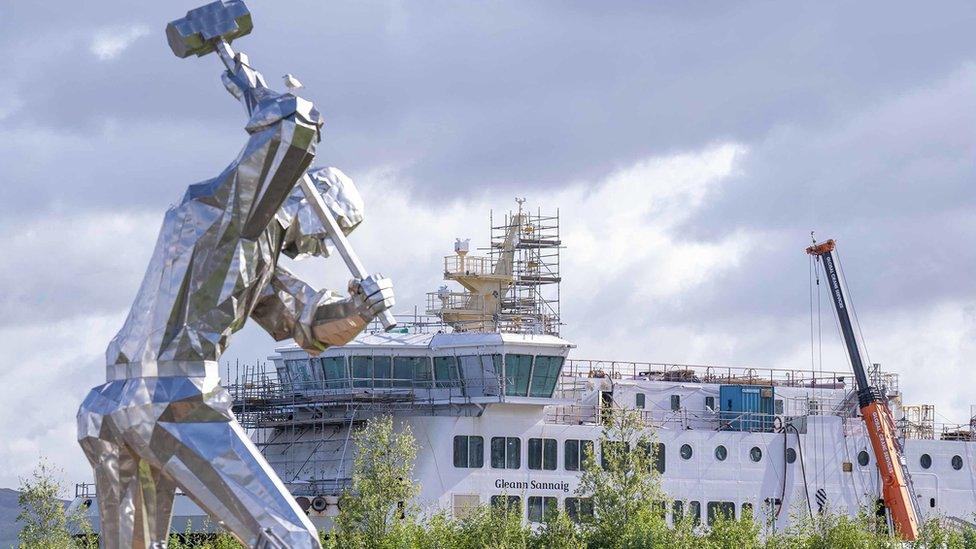Lawyer's Scottish ferries deal report finds no evidence of fraud
- Published
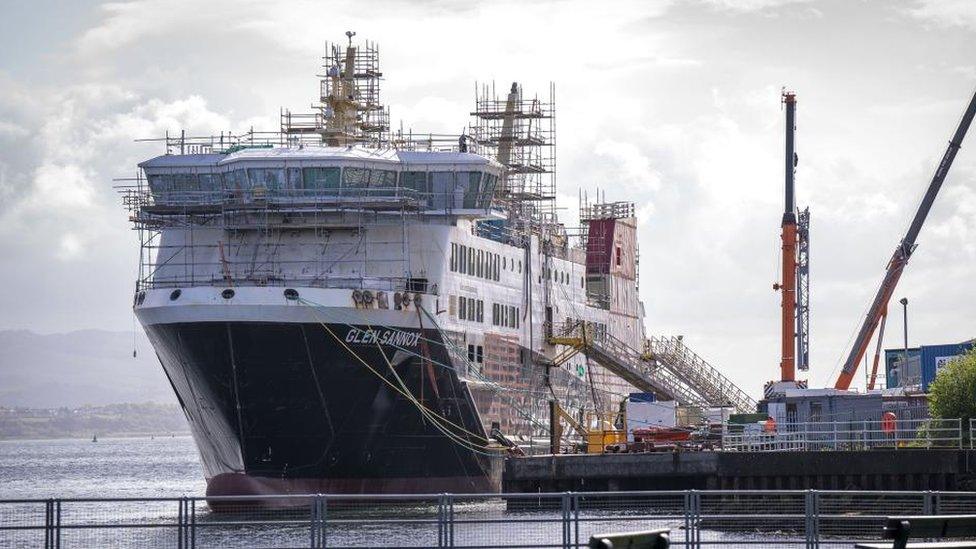
The ferries Glen Sannox, pictured, and Glen Rosa are still being built at Ferguson shipyard
A lawyer-led investigation prompted by BBC claims that a controversial ferry deal may have been rigged has found no evidence of fraud.
KC Barry Smith was appointed following a documentary on two CalMac ferries still being built by Ferguson shipyard.
While finding no evidence of fraud, , externalhe said one aspect was not "entirely satisfactory".
The BBC said it stood by its journalism and the probe's narrow remit excluded examination of the central allegations.
It said the programme had not alleged "criminal fraud" but instead questioned whether the contract was awarded fairly.
The 2015 order for the ferries, which at the time was seen as a boost for the Port Glasgow shipyard, ended up dragging it back into administration as the project went badly wrong.
The ships, Glen Sannox and Glen Rosa, are 3.5 times over budget; six years late and are still under construction at the now-nationalised shipyard, with design gaps and regulatory challenges still emerging.
The BBC Disclosure documentary, The Great Ferries Scandal, last year presented evidence from a "leaked dossier" of documents raising serious questions about how the contract was awarded to the yard by ferries procurement agency CMAL just a year after it was rescued by businessman Jim McColl.
Mr Smith was subsequently engaged by CMAL to establish whether those allegations amounted to "fraud".
The documentary claimed that Mr McColl's company, FMEL, was allowed onto a shortlist of bidders, despite being the only firm unable to produce a letter from a bank, required as evidence of its ability to provide important financial safeguards.
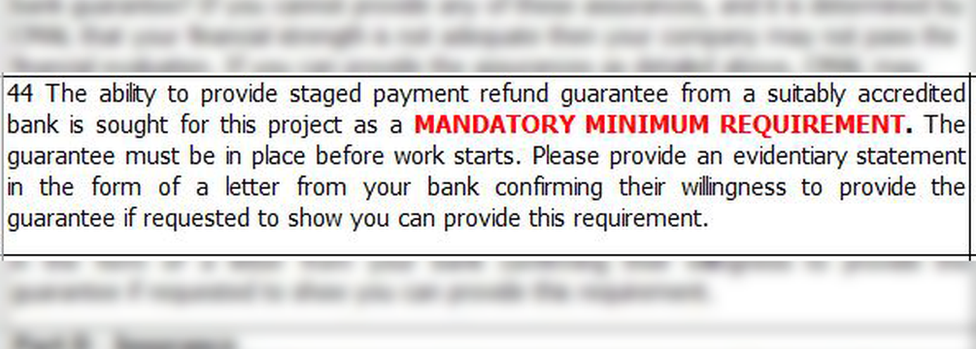
Evidence that a builders refund guarantee could be provided was part of the pre-qualification questionnaire
Mr Smith concluded that this letter was not a mandatory requirement, and that FMEL along with other interested bidders were assessed to have met the qualifying criteria. The pre-qualification questionnaire was "poorly worded" and lacking in clarity, he said.
He notes that when it later emerged that FMEL could not offer a full "builder's refund guarantee", the CMAL board raised concerns and only awarded the contract after seeking direct approval from Scottish ministers in their capacity as CMAL's sole shareholder.
He said CMAL had formed the impression that "Scottish ministers were determined that the contracts go to FMEL".
Ferguson copied a large section of its bid from a CalMac document
The KC also examined how FMEL came into possession of an extremely detailed CalMac specification document, which it then copied as the basis for the technical section of its bid, but which was not made available to rival bidders.
The document, the Specification of Operational and Technical Requirements (SOTR), had been supplied to a design consultant Houlder which did some work for CMAL early in the procurement, and which was subsequently engaged by FMEL as its main design partner.
Mr Smith commented: "Remarkably, it seems that work was not done under contract accordingly, no non-disclosure agreement or the like applied."
This meant there was nothing to stop Houlder using its knowledge of CalMac's requirements when assisting FMEL in its bid.
Mr Smith said he had been told by one witness that the SOTR was by "no means a finished document" and the lawyer suggested this might explain why the contract later went so wrong.
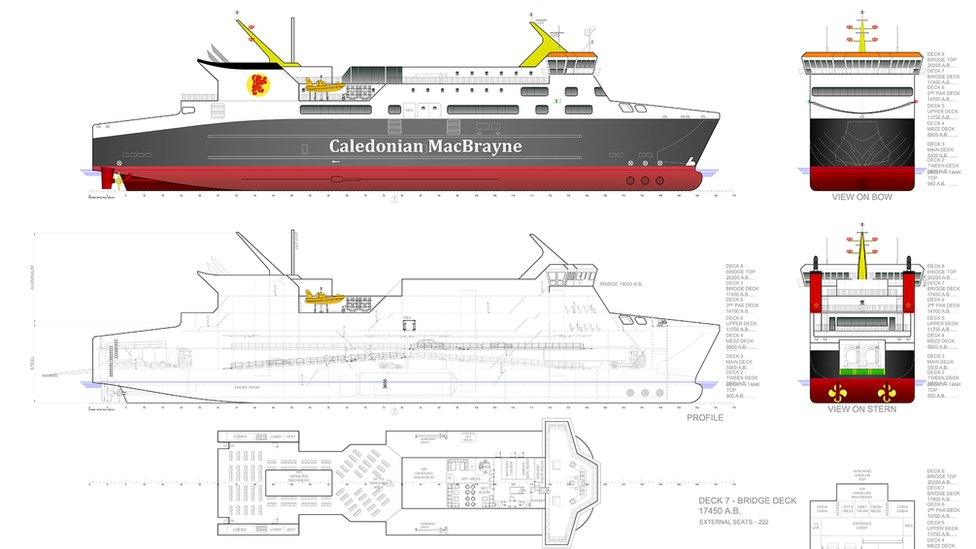
Ferguson was allowed to submit drawings for a much lighter ship after an expert criticised its initial proposed design
He also looked into a BBC claim that FMEL was allowed to significantly change its design, six weeks after the deadline for bid submissions.
He said the opportunity to revise its tender bid "was bound to have had some effect" and this aspect of the procurement was "not entirely satisfactory" but he found no evidence of fraudulent intent by CMAL employees.
In conclusion, Mr Smith said he found no evidence of fraud, but added "that is not the same as saying the procurement was conducted perfectly".
The BBC team was invited by Mr Smith to give evidence to his investigation but declined when it emerged that his remit did not extend to examining whether procurement rules had been broken.
A spokesperson for the corporation said: "The BBC declined to take part in this review after it became clear Mr Smith's terms of reference, which had been agreed by CMAL, explicitly excluded the central allegations made in our film.
"Those allegations questioned whether the ferries contract was awarded fairly and within procurement rules.
"We note that Mr Smith, in his conclusions, mis-states the BBC's published position, and clears CMAL of criminal fraud, an allegation we did not publish.
"We would be happy to share our evidence with any formal, independent inquiry into the allegations that we did publish."
CMAL chief executive Kevin Hobbs said that while the report had identified a "number of missteps" during the procurement in 2014 and 2015, he said new procedures had since been put in place.
"The KC's report recognised the CMAL team at the time of this procurement as diligent, dedicated hardworking individuals," he added.
'Complete joke'
The Scottish Conservatives, however, branded the report a "complete joke" and a waste of public funds.
Transport spokesman Graham Simpson said: "The BBC did not allege there had been fraud, and nobody has ever alleged that.
"The allegation made by the BBC was that the process was rigged. Barry Smith KC should have been asked to consider that question alone.
"Public money has once again been wasted."
Scottish Liberal Democrat economy spokesman Willie Rennie said: "This investigation was never set up to clear CMAL or the SNP government of any wrongdoing, only to provide advice on whether fraud had been committed.
"The bar was set very high.
"The only way to clear up this fiasco is a public inquiry. Islanders, workers and taxpayers deserve clear answers."
Related topics
- Published27 September 2022
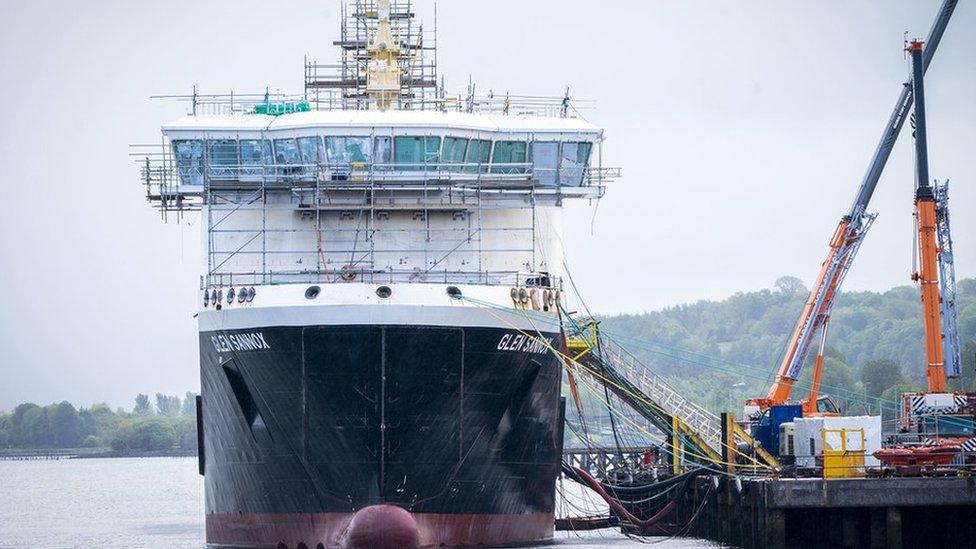
- Published27 September 2022
